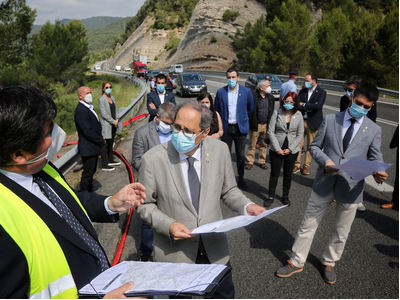- The head of the executive said he will once again demand “the financial resources Catalonia needs” in a meeting with Prime Minister Sánchez to be held on Sunday
- Yesterday, the president and Minister Puigneró visited the site of emergency works to deploy the Government of Catalonia’s fibre-optic cable between Súria and Solsona
- By the end of 2020, all of Catalonia’s counties will be connected to the fibre-optic network, and 84% of the population will be covered

Catalan president Quim Torra stressed that his government is not resigned to accepting the closure of Nissan’s main plant in Barcelona and two nearby facilities. In reference to a meeting with the central government to be held next week, the head of the executive said: “We’ll be going to the meeting with unanimity among Catalonia’s economic and social actors and the support of the Nissan works council. We all want the same thing: to prevent the closure of the plant and to be able to engage in direct dialogue with Japan, based on a unified position across all institutions.” The president cited the example of the Mobile World Congress: “Thanks to the unity across all institutions, we were able to ensure that the MWC will be held in Barcelona again next year and get a commitment for another year.”
The head of the executive was speaking in Valls de Torroella (Bages), where he and the Minister of Digital Policy and Public Administration, Jordi Puigneró, were visiting emergency works under way to deploy the Government of Catalonia’s fibre-optic cable between Súria and Solsona.
In comments to reporters after the visit, the president also made reference to a meeting with Prime Minister Pedro Sánchez to be held today (Sunday). Torra said he would once again call for the return of Catalonia’s competencies and for “the financial resources Catalonia needs”, from both the state and the EU, to be transferred to the Catalan government. “We want to manage these resources because without them we won’t be able to pursue the investment policies Catalonia needs at this time,” he said.
The president also said that Catalonia should be responsible for managing the new minimum basic income scheme. “The Catalan government has been calling for this measure for a long time, and yesterday, two and a half months later, it was approved by the central government.” Torra said the Catalan government was pleased that the scheme had been approved, albeit after a lengthy delay. “At a time when we need to give confidence to workers and employers, it’s a step forward, but it’s not enough,” he said. The president also said it was essential that all laid-off workers receive payment of the benefits they are entitled to, and reiterated a call for paid leave for people who must care for children and dependent persons.
85% of Catalan population connected
After visiting the fibre-optic cable work site, President Torra stressed the importance of the policy of extending the fibre-optic network throughout Catalonia. “This year, we’ll reach 85% of the Catalan population, and getting to 100% is a priority for us.” Minister Puigneró said: “We’ve been an industrial country; now we must be a digital country.”
The deployment of the fibre-optic cable is part of an emergency project aimed at ensuring connectivity for various parts of Catalonia in order to guarantee equal opportunities and territorial integration and cohesion.
The deployment will connect 10 county capitals and up to 51 municipalities in 16 counties around Catalonia.
When this stage of the work is completed, 84% of the population of Catalonia will be covered by the Government of Catalonia’s fibre-optic network, and all county capitals will be connected by the end of the year.